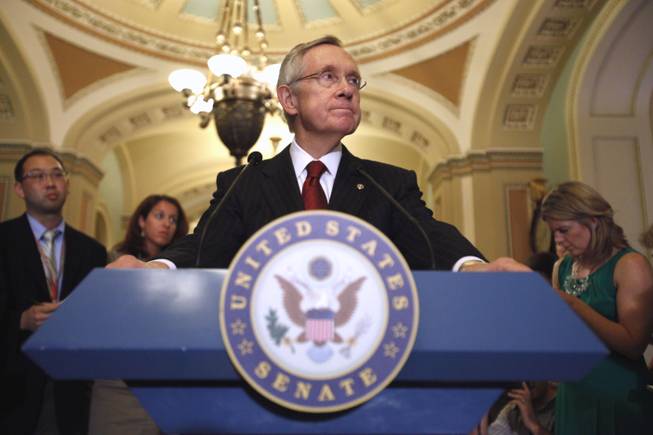
AP Photo/Jacquelyn Martin
Senate Majority Leader Sen. Harry Reid of Nev. pauses during a news conference on Capitol Hill in Washington, Monday, Aug. 1, 2011, to talk about debt ceiling legislation.
Tuesday, Aug. 2, 2011 | 12:04 a.m.
Reid: We Brought Our Economy Back From Brink Of Disaster
Reid: We Brought Our Economy Back From Brink Of Disaster
Heller: The Markets Are Bearing This Out
Heller: The Markets Are Bearing This Out
The Senate emphatically passed emergency legislation Tuesday to avoid a first-ever government default, rushing the legislation to President Barack Obama for his signature just hours before the deadline. The vote was 74-26.
Obama signed the bill little more than an hour later.
Today's vote capped an extraordinarily difficult Washington battle pitting tea party Republican forces in the House against Obama and Democrats controlling the Senate. The resulting compromise paired an essential increase in the government's borrowing cap with promises of more than $2 trillion of budget cuts over the next decade.
"It's an important first step to ensuring that as a nation we live within our means," Obama said after the vote. "This is, however, just the first step. This compromise requires that both parties work together on a larger plan to cut the deficit."
Much of the measure, which the House passed Monday night, was negotiated on terms set by House Speaker John Boehner, including a demand that any increase in the nation's borrowing cap be matched by spending cuts. But the legislation also meets demands made by Obama, including debt-limit increases large enough to keep the government funded into 2013 and curbs on growth of the Pentagon budget.
"We've had to settle for less than we wanted, but what we've achieved is in no way insignificant," said Senate GOP leader Mitch McConnell of Kentucky. "But I think it was the view of those in my party that we'd try to get as much spending cuts as we could from a government we didn't control. And that's what we've done with this bipartisan agreement."
The measure would provide an immediate $400 billion increase in the $14.3 trillion U.S. borrowing cap, with $500 billion more assured this fall. That $900 billion would be matched by cuts to agency budgets over the next 10 years.
The Senate vote was never in doubt after Majority Leader Harry Reid, D-Nev., and McConnell signed on. But like Monday's House vote, defections came from liberal Democrats unhappy that Obama gave too much ground in the talks, as well as from conservative Republicans who said the measure would barely dent deficits that require the government to borrow more than 40 cents of every dollar it spends.


Join the Discussion:
Check this out for a full explanation of our conversion to the LiveFyre commenting system and instructions on how to sign up for an account.
Full comments policy